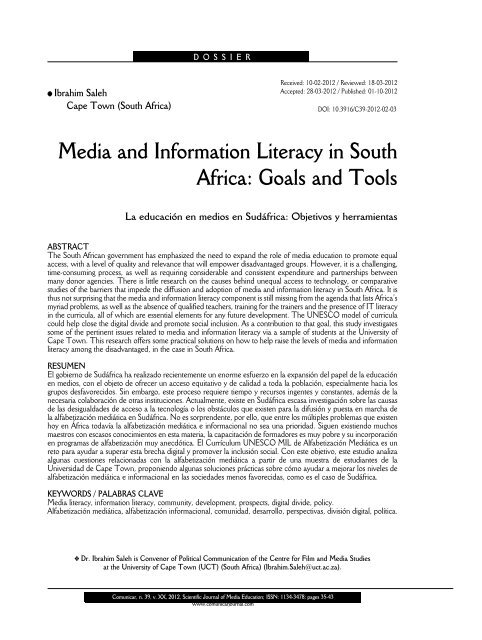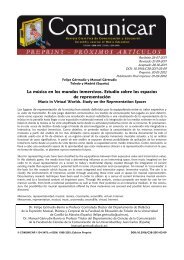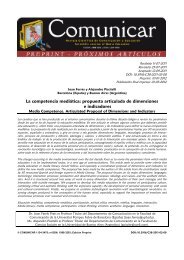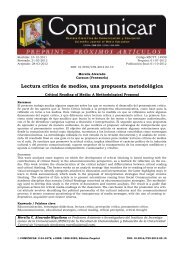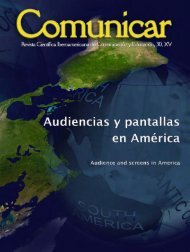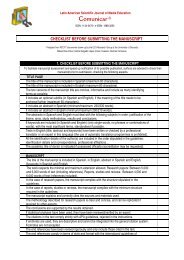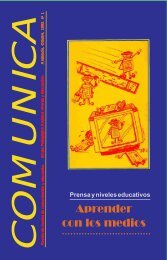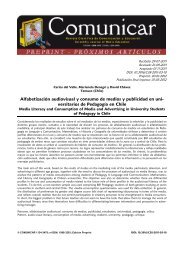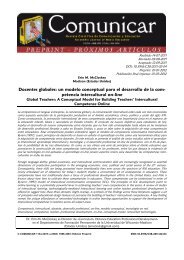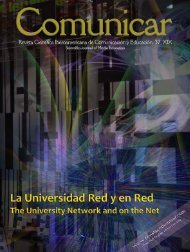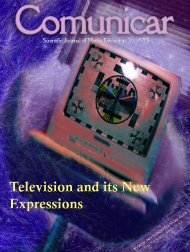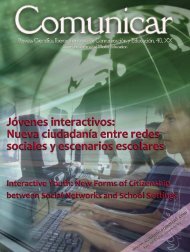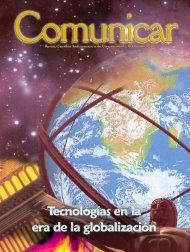Comunicar 39-ingles - Revista Comunicar
Comunicar 39-ingles - Revista Comunicar
Comunicar 39-ingles - Revista Comunicar
Create successful ePaper yourself
Turn your PDF publications into a flip-book with our unique Google optimized e-Paper software.
D O S S I E Rl Ibrahim SalehCape Town (South Africa)Received: 10-02-2012 / Reviewed: 18-03-2012Accepted: 28-03-2012 / Published: 01-10-2012DOI: 10.<strong>39</strong>16/C<strong>39</strong>-2012-02-03Media and Information Literacy in SouthAfrica: Goals and ToolsLa educación en medios en Sudáfrica: Objetivos y herramientasABSTRACTThe South African government has emphasized the need to expand the role of media education to promote equalaccess, with a level of quality and relevance that will empower disadvantaged groups. However, it is a challenging,time-consuming process, as well as requiring considerable and consistent expenditure and partnerships betweenmany donor agencies. There is little research on the causes behind unequal access to technology, or comparativestudies of the barriers that impede the diffusion and adoption of media and information literacy in South Africa. It isthus not surprising that the media and information literacy component is still missing from the agenda that lists Africa’smyriad problems, as well as the absence of qualified teachers, training for the trainers and the presence of IT literacyin the curricula, all of which are essential elements for any future development. The UNESCO model of curriculacould help close the digital divide and promote social inclusion. As a contribution to that goal, this study investigatessome of the pertinent issues related to media and information literacy via a sample of students at the University ofCape Town. This research offers some practical solutions on how to help raise the levels of media and informationliteracy among the disadvantaged, in the case in South Africa.RESUMENEl gobierno de Sudáfrica ha realizado recientemente un enorme esfuerzo en la expansión del papel de la educaciónen medios, con el objeto de ofrecer un acceso equitativo y de calidad a toda la población, especialmente hacia losgrupos desfavorecidos. Sin embargo, este proceso requiere tiempo y recursos ingentes y constantes, además de lanecesaria colaboración de otras instituciones. Actualmente, existe en Sudáfrica escasa investigación sobre las causasde las desigualdades de acceso a la tecnología o los obstáculos que existen para la difusión y puesta en marcha dela alfabetización mediática en Sudáfrica. No es sorprendente, por ello, que entre los múltiples problemas que existenhoy en África todavía la alfabetización mediática e informacional no sea una prioridad. Siguen existiendo muchosmaestros con escasos conocimientos en esta materia, la capacitación de formadores es muy pobre y su incorporaciónen programas de alfabetización muy anecdótica. El Currículum UNESCO MIL de Alfabetización Mediática es unreto para ayudar a superar esta brecha digital y promover la inclusión social. Con este objetivo, este estudio analizaalgunas cuestiones relacionadas con la alfabetización mediática a partir de una muestra de estudiantes de laUniversidad de Cape Town, proponiendo algunas soluciones prácticas sobre cómo ayudar a mejorar los niveles dealfabetización mediática e informacional en las sociedades menos favorecidas, como es el caso de Sudáfrica.KEYWORDS / PALABRAS CLAVEMedia literacy, information literacy, community, development, prospects, digital divide, policy.Alfabetización mediática, alfabetización informacional, comunidad, desarrollo, perspectivas, división digital, política.v Dr. Ibrahim Saleh is Convenor of Political Communication of the Centre for Film and Media Studiesat the University of Cape Town (UCT) (South Africa) (Ibrahim.Saleh@uct.ac.za).<strong>Comunicar</strong>, n. <strong>39</strong>, v. XX, 2012, Scientific Journal of Media Education; ISSN: 1134-3478; pages 35-43www.comunicarjournal.com


